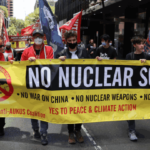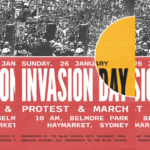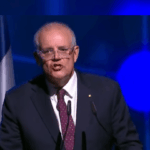Police Turn Woman’s Life Upside Down: An Exclusive Interview with Helen Steel

Helen Steel describes herself as a “gardener, union rep and campaigner for environmental and social justice.” She’s been involved in activist movements across the United Kingdom since the 1980s, and famously fought McDonald’s in what was later described as the ‘worst corporate PR disaster in history’.
Recently, Ms Steel was at forefront of another PR disaster, this time involving the London Metropolitan Police. In 2011, she discovered that her former long-term partner, known to her as John Barker, had actually been an undercover spy from the SDS – a group set up to infiltrate and monitor activist groups across the UK. Last year, the police were forced to make an unprecedented apology to Ms Steel, and seven other women, whose lives and privacy had been invaded by the group.
Helen was recently in Sydney to confront her former partner, whose actual name is John Dines and now teaches policing in Manly. While here, she spoke to Sydney Criminal Lawyers® about her experience.
Could you tell us about ‘Police Spies Out Of Lives’, and how your court case came about?
Police Spies Out Of Lives is the support group that was set up for our court case. I had a two year relationship with an undercover policeman and I didn’t find out for many years, it was nearly 19 years after he disappeared that I found out he’d been an undercover policeman.
Around that time, there was similar case exposed in the media, and that was being portrayed as a rogue officer. I got together with seven other women who had been deceived into relationships by different undercover policemen, and it became very apparent that these were not the actions of rogue officers but an extremely abusive tactic being used by the Metropolitan Police.
We brought a court case against the police for the harm that those relationships caused, and in November last year they made an unprecedented apology. They acknowledged that the relationships were human rights abuses, and that they never should have happened. They also said that they should never happen again.
And what about your relationship with John, how did you find out he was an undercover policeman?
I was involved with London Greenpeace, an environmental and anti-capitalist group, and he started attending the meetings in 1987. Over the course of the next three years we became close friends, and then we started a relationship which lasted about two years.
We moved into a flat together, we talked about starting a family, and we talked about spending the rest of our lives together. Toward the end of the relationship he seemed to be going through some sort of mental breakdown, and then he suddenly disappeared. I was worried about his wellbeing, and also I was deeply in love with him so I tried to find him.
In the course of that, it turned out that basically everything he’d told me was false, but I didn’t find out what he’d been doing until 19 years later, when another woman who’d also been deceived into a relationship with an undercover policeman got in contact to tell me her partner had confirmed that John was also an undercover policeman.
How does your experience compare with the other women you launched your court case with?
One of the interesting things about working with the other women was finding out that the individual sob stories from each of the men turned out to be repeated to pretty much all of us.
The details weren’t identical but pretty much either their parents were dead, or they weren’t around, or they had dementia, so their family was never around. They all claimed to have had traumatic childhoods, which meant they all had no contact with their family, and they didn’t have friends around them. And they all claimed they were having mental breakdowns as an excuse for leaving.
It became apparent that there was no way that this could keep happening by coincidence, it had to be from some kind of training program.
You’ve argued, and the police have admitted, that this was a human rights abuse, why is that?
It’s different in every country but in Europe: Article 3 of the European Human Rights Convention explicitly prohibits torture, and that includes mental torture; Article 8 says you have the right to privacy and family life; and Articles 10 and 11 say that you have the right to freedom of expression and freedom of association without interference from the state.
All of those rights were breached by the police invading our lives in this way.
How extensively do you think police use undercover police officers in this way – both in the UK and internationally?
It’s hard to know the extent of undercover policing because they try and keep it all secret, they don’t want the public to know that they’re spying on movements who challenge what people in power are doing.
What we do know is that the unit that John was a part of was set up in 1968, and they sent 10 officers a year into different protest movements to report back on what they were saying. That particular unit shut down in 2008, but before that there was another National Public Order unit set up which does similar work around the UK, and that was replaced by another group.
We don’t know the exact extent, but we do know that it goes on and that it shouldn’t. We also know that a considerable number of these former officers have gone on to work in universities teaching other officers or teaching students these discredited tactics, and it’s likely that further human rights abuses will occur as a result. That’s why I came to Australia, to try and highlight this issue and prevent it happening to anyone else again.






